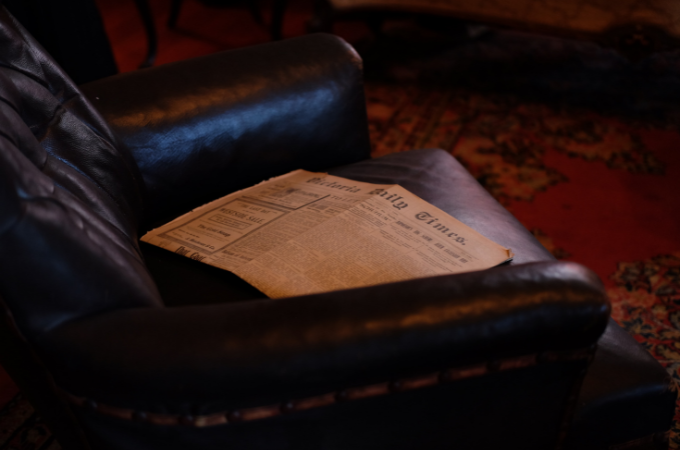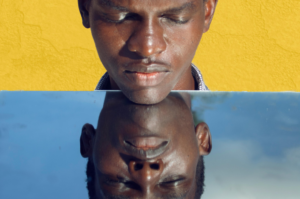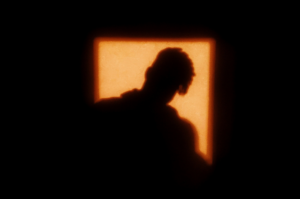
Start with a chair, she thinks. Read the letter, she says to herself.
Start with the chair, the one that was her father’s, the one with the heavy wooden legs, with the high back covered in brown leather that is shiny and worn in parts. The chair looks forlorn, without purpose. It has gone from imposing to an old forgotten thing, uncared for, decaying, without her father in it. It is less of what it is, what it was. All things are less of what they were since she got the phone call. The phone call that told her that her father died of a heart attack in the middle of the day, sitting in this chair where he always sat, poring over his writings, his books.
She tells herself again that she must sit down to read the letter he wrote her, the letter he was writing when his heart stopped. They, her aunts and uncles, waiting on the other side of the door, do not know that she caused this. She killed her father. It is a fact, a truth, that she knows as sure as she can see her shaking hands. She broke his heart when she stopped speaking to him six months ago. “I am sorry,” she mouths quietly. Her words travel into the silent, empty room. She wipes her eyes furiously as her tears tickle her cheeks. Finally, she sits and unfolds the letter, and begins to read.
My dear daughter,
Omo mi. The first child of my loins, the one that made me a father after eight years of waiting. Your silence pains me. Please, you must stop hurting me like this. Stop shutting me out of your life. I am sorry that I am not perfect, that I bore you a sibling behind your mother’s back. I am sorry that—
She takes a deep breath to cool the fire that has spread from the tips of her toes to her fingers. She stops reading, stands back up, walks over to the first of the floor-to-ceiling mahogany shelves that cover every wall of the room. She runs her hands over the books, remembering the many conversations she had with him. On Wole Soyinka and Chinua Achebe, on Flora Nwapa and Efua Sunderland, on the writing of Tayeb Salih versus that of Cyprian Ekwensi.
“Bami, you think all these your small-small writers can write, eh? Pass me that book over there. Let me explain why your Chimamanda Adichie and Leila Aboulela will never be Buchi Emecheta.”
“Daddy, e fi mi le. You are biased. Look at all the literary prizes Chimamanda has won. I keep telling you. Just read one of her books first. You’ll see how good she is.”
“Ha! No, child. Have you not learnt anything from me? Is it by prizes you know a good writer?”
She catches herself smiling. He talked like that despite the many plaques sitting on the floor, on the room’s far side, each carrying his name in bold shiny lettering, some in gold, others in silver.
She remembers too, his face contorted, his eyes expectant with hope of understanding. She hears him all over again, unburdening himself, telling her this secret that he kept from her, from her mother. That she has a sister, twenty-four years her junior, born as cancer ravaged her mother’s body, when her mother could no longer see, when she could barely form words. How could he do it? How could he take their family of three, throw it against a brick wall, and smash it into pieces?
She had thought him a colossus, the standard for potential boyfriends. She had seen him the way others spoke about him, using words like genius, maverick. She learnt that day that he was also without integrity, a pretender, selfish. He went to his whore while her mother suffered. Her mother, who had dedicated her life to him, to the both of them.
Her mind continues its tricks, producing memories that she does not want. She sees
him reading to her mother every night, wiping her mother’s saliva, her vomit, and later her bottom when she begins to soil herself; runny greenish-brown poos that streak cushions, pillows, bedsheets, everything. She remembers too how he held her mother when every part of her body convulsed with pain, how broken he looked when it was finally over. She sighs, then hisses, pulls her mouth into a circle and forces air through her teeth. This is why she stopped talking to him; because she could not marry his two sides.
She thought she was him, and he was her. Her looks were her mother’s—long legs, curves, brown eyes, off-black tight curly hair—but her values were his. Even when they were not speaking, he was there teaching her, reassuring her, helping her to choose right from wrong. She caught herself repeating some of his sayings at work, while out with friends, as she drove snail’s pace through the heavy traffic of Third Mainland Bridge and the tolls of Lekki Link bridge. “In this house, we do what we should do before the thing we want to do. That is
duty.”
She sits again, yoga-like, her feet sinking into the plush carpet. Deep breaths, she thinks. She counts out loud; four in, six out, four in, six out. Then, out of nowhere, she hears her mother, the one she loved but did not idolise. Her voice is repeating a lesson she refused to take while her mother lived, did not fully understand till this very moment.
“Bami, you are too black and white. You should judge a person by the sum of their lives, by the totality of who they are, not a single mistake.”
Her heart contracts enough to make her suck in air through her mouth again. The hiss is more forceful this time, unusual for her. Her tears create a round wet patch on the carpet, but she does not attempt to wipe them away.
Photo by Jingda Chen on Unsplash










Chinyere May 15, 2023 03:02
Beautiful. Looking forward to the conclusion. We should collaborate sometime too.